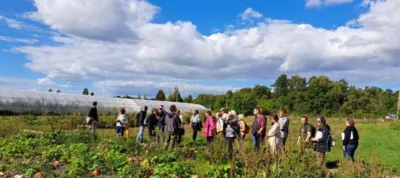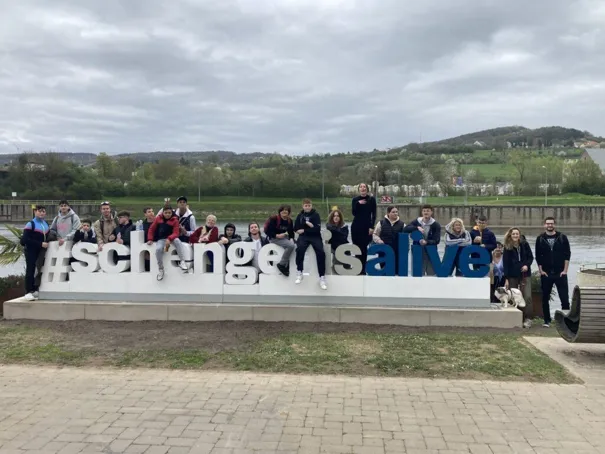General information
RDP Priority
- P6. Social inclusion and local development
RDP Focus Area
- 6B: Local development
RDP Measure
- M19: LEADER/CLLD
Beneficiary type
- Local Action Group
Summary
The transnational LEADER cooperation project ’NoperTrips’ (Luxembourgish for ‘Neighbour Trips’) aimed to facilitate cross-border cooperation and knowledge exchange between various stakeholders in the LEADER-regions of Miselerland, in Luxembourg, and Moselfranken, in Germany. Thematic trips were organised that addressed topics such as biodiversity, democracy, wine production, wine marketing, and community engagement, mostly for professional stakeholders.
These trips provided opportunities for participants to learn from one another and exchange views on best practice, contributing to stronger cross-border networks.
Results
- More than 400 participants took part in the 15 NoperTrips that were organised between 2021 and 2023.
- NoperTrips helped to reinforce regional networks, facilitating the rapid organisation of collaborative efforts such as post-disaster support.

Promoter
LAG Miselerland (LU) in cooperation with LAG Moselfranken (DE)
Funding
Total budget: 105 988 (EUR) (total budget LU & DE)
EAFRD: 31 796 (EUR)
National/Regional: 21 198 (EUR)
Other: 52 994 (EUR) (DE)
Ressources
Liens
Context
On the western bank of the Moselle River in Luxembourg lies the LEADER region of Miselerland, while on the eastern bank, in Germany, is the LEADER region of Moselfranken. Despite being separated only by the river, locals in these neighbouring regions often have limited knowledge about life and work on the other side of the border.
Many citizens in this transnational LEADER region take advantage of the open border between Moselfranken (DE) and Miselerland (LU), frequently engaging with those on the other side of the Moselle or Sauer rivers. However, these interactions tend to be one-dimensional, often restricted to small-scale cross-border activity for basic necessities, such as shopping or refuelling. For some organisations, this narrow perspective among their members can lead to a distorted perception of the neighbouring region.
Objectives
The Neighbour Trips project aimed to foster cross-border cooperation and knowledge exchange on topics such as biodiversity, democracy and wine production in order to:
- increase knowledge of the history, society and economy of the neighbouring region, thereby strengthening regional civic education;
- exchange examples of best practice;
- increase understanding and break down clichés; and
- inspire new projects and initiatives in both areas.
Activities
The project organised meetings and visits, enabling interaction between associations and organisations from both countries. The individual activities included:
- identifying and contacting interested parties that would be willing to showcase their good practice projects.
- organising 15 thematic visits (NoperTrips) to selected projects/initiatives across the border related to wine, architecture, biodiversity, democracy, youth, tourism and the food transition. Visits were organised to Bernkastel, Leiwen, and Mesenich (DE); to Ancy, Bruley, and Toul (FR); to Betzdorf, Manternach, Niederanven, Remerschen, Schengen, and Wasserbillig (LU).
- key events such as educational trips, conferences and workshops involving multiple stakeholders from Germany, France and Luxembourg on topics including:
- a workshop on post-flooding response solutions for winemakers;
- the ‘Via Mosel’ guest guide educational trip across three countries;
- the ‘Recruiting for democracy cross-border’ conference in Remerschen (LU);
- a workshop on protected designation of origin (PDO) for wines of the European Moselle valley;
- a workshop on biodiversity protection through the preservation of orchards in Manternach (LU);
- a workshop on biodiversity protection in vineyards and landscape planning in Ancy (FR);
- a networking conference: ‘Promoting democracy’ in Wasserbillig (LU);
- a workshop on food transition and agronomy supplies in Toul (FR);
- a cross-border festival;
- a public NoperTrip to Schengen (LU);
- a workshop on innovation in wine production in Bernkastel-Kues (DE);
- a hiking and geocaching activity with young people from Germany and Luxembourg in Schengen (LU);
- a workshop on the biodiversity-friendly maintenance of communal green areas in Niederanven and Roodt-Syre (LU); and
- a workshop on innovation in wine production in Remich and Schengen (LU).
Main results
- The project succeeded in attracting many participants. More than 400 people took part in the 15 NoperTrips that were organised between 2021 and 2023.
- NoperTrips helped reinforce regional networks, facilitating the rapid organisation of collaborative efforts such as post-disaster support.
Key lessons
To ensure high participation in the individual trips, several good practices have been put in place:
- Tailored invitations: a targeted invitation list is crucial for ensuring strong attendance at events.
- Local partnerships: collaboration with local partners is essential for organising interesting and effective trips.
- Use of interpreters: employing interpreters is beneficial, especially if they are familiar with the subject matter.
- Target audience adaptation: identifying and inviting appropriate groups for specific themes is important for engagement and effectiveness.
- Public engagement: public NoperTrips required extensive promotion and were often perceived more as interesting visits rather than true exchanges.
- Community involvement: encouraging local communities, associations and stakeholders to propose themes and ideas can enhance the relevance and impact of the trips.
The NoperTrip project put in contact professional stakeholders from both sides of the border. In addition to the training that was provided during the field visits, the exchange between participants helped to strengthen the networks across the border and allowed for cross-border learning.
Thomas Wallrich

